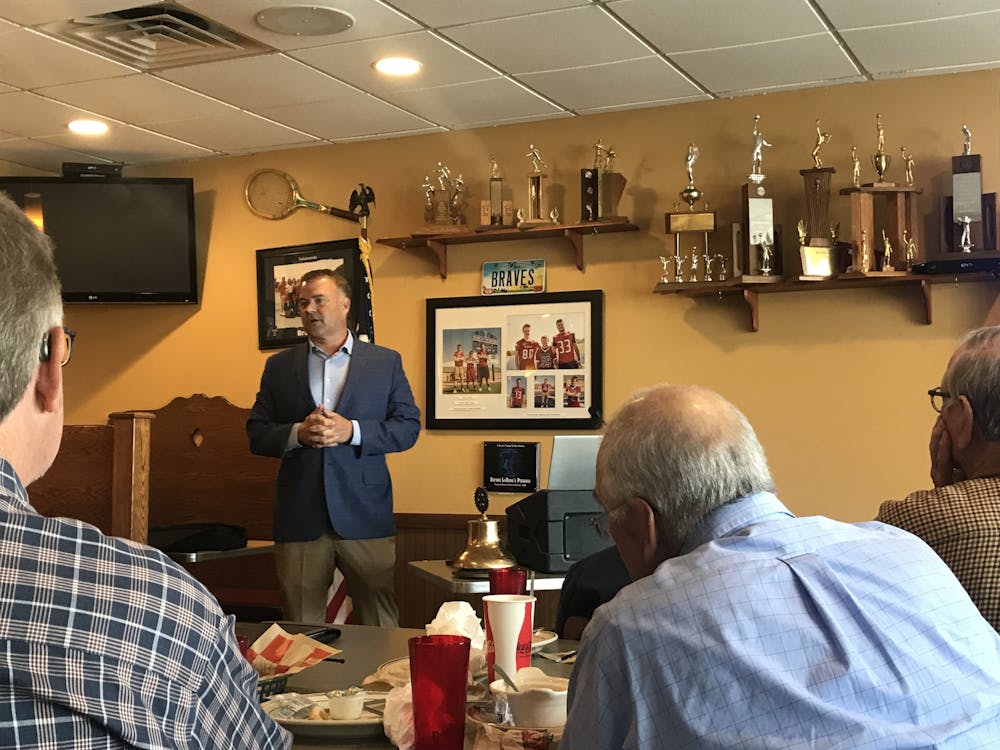In January 2020, Russia's President Vladimir Putin proposed an amendment that was later ratified to secure his executive power until 2036.
In September 2022, Hungary was no longer considered a “full democracy” by the European Parliament for concerns about the functioning of the country’s electoral system.
These attacks on free and fair elections and democracy are what David Pepper, the former chair of the Ohio Democratic Party, calls a “fire-alarm democracy.”
“Everything I’ve just described, what we would see as a crisis of democracy in other countries, is happening in Columbus, Ohio, Florida, Missouri, Tennessee,” Pepper said.
On Wednesday, Pepper visited the Oxford Rotary Club to discuss the future of democracy in Ohio and to play a nonpartisan part in democracy.
“The democracy and rule of law in Ohio are on life support at best,” Pepper said. “And what we are seeing is a completely rigged system of statehouse districts. We're seeing a repeated violation of the rule of law by those in power.”
Pepper said the reason a majority of Ohio residents aren’t concerned about the state’s democracy is due to a historical overconfidence voters have, citing the Voting Rights Act and previous battles for fair and equitable voting.
“We have been blinded by thinking, ‘Oh we’re America, we have democracy,’” Pepper said. “We don’t see the threat.”
Additionally, Pepper said voters are blinded by partisan politics. Political figures like Marjorie Taylor Greene and Alexandria Ocasio-Cortez flood news headlines and X (formerly Twitter) feeds, overwhelming and polarizing voters even more.
But outside Washington, D.C., and Congress, Pepper argued the most impactful institution on America’s democracy are statehouses.
“The truth is that on almost every major issue in American politics, the statehouse has a more direct effect on the people in that state than anyone in Congress does,” Pepper said.
Statehouses determine how residents can vote in that state, thus guiding democracy. He expanded on the impacts of gerrymandering and Ohio’s special election in August, which would have made it harder to amend the state Constitution with a required 60% majority on ballot measures and signatures from all 88 counties before an issue could be placed on the ballot.
Enjoy what you're reading?
Signup for our newsletter
“You might not agree with this, but the defeat of Issue 1 on August 8 was a multi-partisan effort,” Pepper said. “It was Bob Taft and John Kasich and Maureen O’Conner and Betty Montgomery and the Libertarian Party, and democrats, and independents.”
Pepper encouraged voter participation and civic engagement from both parties, arguing that accountability ensures elected officials keep voter interests at the forefront.
Matt Wyatt, a member of the Rotary Club, invited Pepper to come speak because he felt that it was an important issue to speak about ahead of the November election.
“I think our country and all communities, especially more rural communities, need to have an uncomfortable conversation about the reality of democracy,” Wyatt said.
Wyatt, who moved to Ohio from Kentucky almost two years ago, said he’s worried about the future of democracy in Ohio and hopes that the talk encourages more people to be politically active.
“This is an issue that is affecting all states,” Wyatt said. “Ohio is so important … because this is a state that can and should be competitive.”
Betsy Hope, a member of the Rotary Club for three years, enjoyed Pepper’s discussion and appreciated the state-level focus.
“I never really thought about it much that way, but if the government’s at a gridlock, whether it truly is or whether it just seems like it is, the state level is where things can really happen and do happen, so we have to pay attention to that,” Hope said.
Over the past three years, Hope has heard many speakers at the club, from local coaches to educators to mental health experts, but appreciated how “down-to-earth” Pepper spoke.
“I think he was a good speaker for our group, but I think he would be a good speaker for any group because he makes everything so understandable,” Hope said.
Pepper said it was important for him to attend the Rotary Club’s meeting because although it is a nonpartisan group, he wanted to be sure they knew they could still play an active role in supporting democracy.
“I really worry that good, civic-minded groups feel like they can’t be a part of the solution to what’s happened to democracy because they think it’s too political,” Pepper said. “Whenever I have a chance to talk to beyond just parties, to groups like this, I take advantage of it, because I think groups like this can play a huge role in a lot of ways.”




